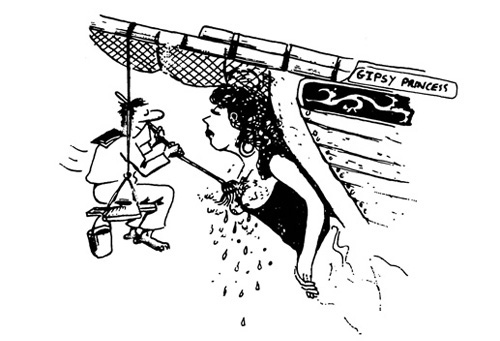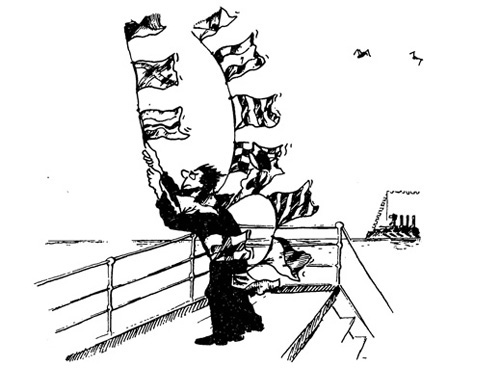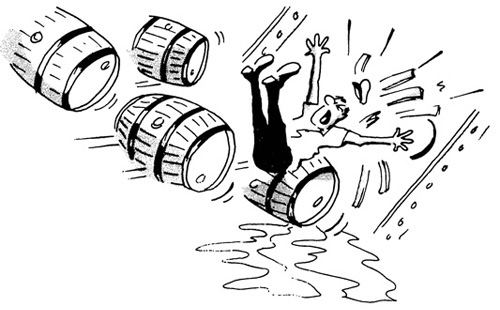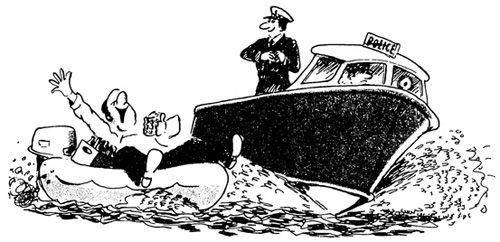Salty Dog Talk (5 page)
Authors: Bill Beavis
Even keel
Gangway
From the Gaelic
gang
or go; (‘Till all the seas
gang
dry’). Originally a gangway was the platform in the waist where the ship’s boats were stowed and so called because it provided a convenient walkway from the forecastle to the poop deck. By extension the planks and ladders used for access at the ship’s side became gangways and later a passageway of any kind anywhere!
Popular saying amongst TV cops. This could have a connection with the underworld, ‘a slippery customer’ for example, but then again it was not uncommon for ships to escape by slipping their ropes or anchor cables. The point of this was that it could be done secretly with no noise and no assistance from the shore.
A plea from the victimised! It is from the book about
Sinbad the Sailor
in which the ‘old man of the sea’ climbs onto his back and refuses to get off. Sinbad eventually dislodges the nuisance by getting him drunk. Always worth a try.
A slang expression which arose from the excitement and confusion of preparing a warship for sea at short notice. It dates from World War I in the huge fleet anchorages such as Scapa Flow in Scotland when the order to put to sea was preceded by hurried flag signals (the ‘flappings of flags’). An associated expression
there’s a flap on
also derives from this. Scapa Flow was known as ‘Flappa Flow’.
A term which has sadly degenerated. When it first appeared in early ships it was the strong room where species and treasures were kept. It next turns up as a lazaretto or locker, then later descends to coal-burning ships where it was the name given to the stokers’ accommodation. Finally, in the age of popular liner travel, the glory hole moved up into the eye of the ship to become the stewards’ mess. It has remained a mess ever since.
Popular amongst airmen of World War II to describe those missing or killed in action. It is one of several expressions which transferred from the navy when its air wing was merged into the RAF in 1918. There are two derivations, each of them plausible. The first refers to a
Spanish Burton
which was an ingenious but complicated pulley arrangement made up of three blocks. Indeed so complicated was the Spanish Burton, and so rarely used that hardly anyone could remember how to do it. Thus it became the standard answer to anyone in authority enquiring the whereabouts of a missing member of a working party ‘he’s gone for a burton’. The other explanation comes from the term ‘a burton’ an unusual method of stowing wooden casks or barrels sideways across the ship’s hold. The advantage of this was that they took up less space and were individually more accessible than when stowed in the fore-and-aft line. The disadvantage however, and the reason why it was rarely employed, was that the entire stowage could easily collapse. Hence the implication of knocking a man over.
In the
Vulgate
, the Latin translation of the Bible, the word for rudder is
gubernaculum
derived from the verb
guberno
which originally meant to steer. Thus our word government comes from the Latin for one who steers.
A vessel is said to gripe when, through bad design or sail balance, she repeatedly noses up into the wind which causes her sails to flap and her speed to fall. She will also be a pig to steer. Another of the many expressions that sailors have applied metaphorically to humans. To gripe is to complain perpetually.
Derived from grogram, a coarse silken fabric and one particularly favoured by Admiral Vernon who had a boat cloak, and, some say, trousers made from it. It resulted in his nickname ‘Old Grog’. Vernon’s great ambition was to instill a greater degree of sobriety amongst his sailors, many of whom quite regularly consumed a pint of rum per day. On his insistence, the daily ration of rum was diluted to the proportion of one part rum to three parts water and thereafter watered-down rum was always known as
grog
. Still however 50% proof and enough to make anyone feel groggy.
Swell is the name given to the low undulations of the sea, remnants of a faraway storm. Unlike waves, which are localised, a swell can be almost imperceptible. However, when it enters shallow water and ‘feels’ the ground the friction causes the swell to steepen. It then becomes a ‘groundswell’ and more noticeable in appearance. Figuratively the word is applied to an early change, especially in public opinion.

Figurehead
Half Mast
The world-wide custom of wearing a flag at half mast goes back to 1612 when the ship
Hearts Ease
sailed up the Thames estuary with her ensign at half staff in respect for her captain killed by eskimoes while searching the N.W. Passage. Previously ships had always worn black flags in tribute to the dead.
When the yards which carry the sails are not properly braced to catch the wind they are said to be ‘half slewed’. In this condition they are ineffective, they will also sway and the sail will shake. Not unnaturally the term has come to describe a drunk, or somebody well on the way.
From the Spanish word
hamaca
. Colombus saw natives in San Salvador sleeping in cotton nets slung between trees and seeing the advantage for shipboard use immediately adopted the idea. Hammocks became widely used in ships in the Royal Navy and by 1660 most men shared one between two. Still popular in some backward parts of South America, the traveller brings his hammock, the hostelry provides the hooks.

Getting into a flap
The expression has been shortened. It was formerly ‘hard up in a clinch with no knife to cut the seizing’. Hard up is the nautical description for any movement which has become checked; two pulley blocks are said to be hard up when they touch and there is no more purchase to be gained.
Gratis! but not, as popularly thought, a play on the word ‘free’. The man Harry Freeman actually lived. He owned a wharehouse and quay at Tooley near London’s Tower Bridge and it was his custom to give free beer to the seamen whose ships called there.
To make heavy weather or heavy going of something is to make unnecessary hard work; to meet heavy weather is to suffer unexpected difficulty. Each compares with a ship labouring in heavy seas.
The harlot’s call to the sailor ‘Hi-Jack!’ It acquired its more sinister meaning when after their first embrace she hit him with a lead-filled handbag – or alternatively lured him into a boarding house from where he would be dragged the next morning in vest and socks to be sold to a ship in need of a crew.
This practice was prevalent along California’s notorious Barbary Coast where ships, emptied of crew by the call of the goldrush, were desperate and prepared to support such intrigues. It became known as
shanghai-ing
, probably because many of the ships were employed in the China trade. Sometimes the tables were turned, seamen did occasionally drag boarding house operators off to sea, others took the girls.
It is difficult now to know whether there was any difference implied in the two phrases; ‘to get hitched’ or ‘to get spliced’. Both are understood to mean marriage and were the sailor’s equivalent of tying the knot. Hitching however is a temporary arrangement; the whole point of making a hitch is that it can be undone again. Splicing, on the other hand, is permanent.
An area of light winds and calms roughly between 30 and 35 degrees north but which does not have the heavy rains associated with the doldrums further south. The popular derivation suggests the name came from the unhappy job of having to destroy the horses when ships, caught in these calms, found their water supplies depleted. This however seems an unlikely explanation for while huge numbers of horses were carried by ships transporting armies, it is improbable that they would run out of water just a month or so outward bound. The name is more likely to have come from the previously mentioned custom of throwing the ‘dead horse’ effigy overboard. It would be about this point of the voyage that the seamen would have worked off their advance of pay.
From the principle of naval warfare that a fight begun on the open seas can be carried into neutral waters if the enemy tries to escape; it was known then as hot chase. The most quoted example in naval history occurred in 1759 when Admiral Boscowen’s fleet destroyed three French ships in Lagos Bay. The Portuguese, whose territory this was, accepted the principle and the intrusion as they were unfriendly towards the French.
From the word
hulk
which is the hull of a derelict ship. Shakespeare describes Falstaff as a ‘hulking great fellow’. Big, clumsy or unwieldy.
I’m Alright Jack
The ultimate in self-consideration. In complete form the expression is ‘Blow you Jack, I’m inboard’ and comes from the standard joke that the first liberty man to climb the ship’s side from the boat pulls the rope ladder up behind him.

Gone for a burton

Half slewed
Jacknife
The word comes from the hinged-blade
jacknife
named after its inventer Jacques de Liege. Jack knives were carried by officers, the crews wore a sheath knife attached to a belt. Today a high diver who touches his feet before hitting the water, a man who folds in a fight, or an articulated truck which folds in a skid are all said to jacknife.
From the Latin
juncus
or
jungo
which means to join. Junk became the word for rushes which were joined together to make baskets and mats. By extension that included rope because it was also made from rushes. It came to be applied more specifically to old rope which had begun to break down and resemble its basic material. Hence its present use to describe dumped and worn out items.
Keelhaul